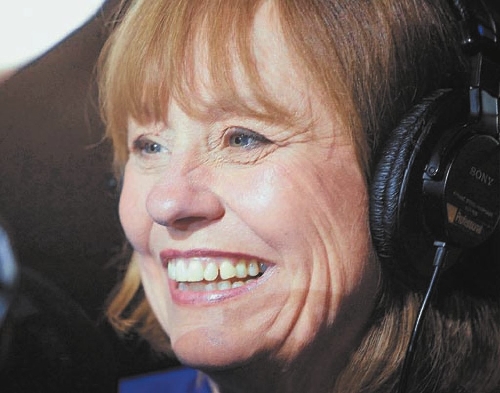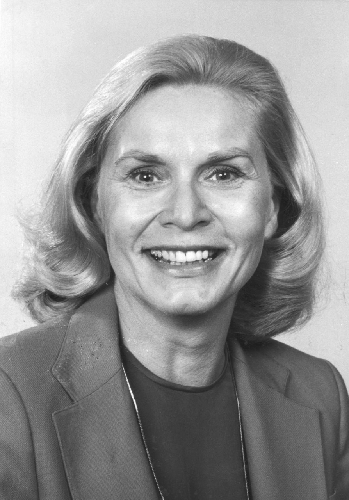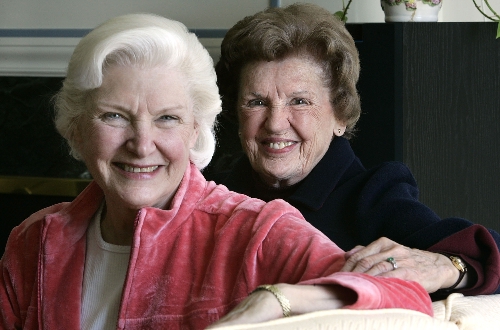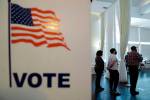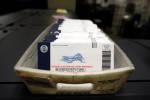Sharron Angle aims to become first female senator from Nevada
Sharron Angle would make history as the first female U.S. senator representing Nevada if she were to beat incumbent Sen. Harry Reid in an election that's one for the record books.
Angle's gender both hurts and helps her, said political analysts and former groundbreaking female officeholders who agreed on one thing: Picking up more votes from women may make the difference between winning and losing for the former Reno assemblywoman.
"Gender still matters," said Jennifer Duffy, senior editor of the Cook Political Report.
Angle is a staunch conservative, something that tends to turn off female voters, pollsters say. But disgust with the male-dominated Senate club, run by Democratic leader Reid, could open the door for more women to win .
Duffy said Angle has the potential to win, even without a majority of female votes; but she needs to close the gap with Reid, including by gaining support from more women not aligned with either party.
"She still has a way to go before voters, and especially independents, know her well," said Duffy, adding that Angle's conservative views still may "turn off many women."
For now, Angle has an edge among independents, 41 percent to 37 percent for Reid, according to a June 1-3 Mason-Dixon poll for the Las Vegas Review-Journal.
Duffy said Angle needs to make a big push for those voters to make up ground against Reid, who now has far more female backing.
Angle won support from only 38 percent of female voters compared with 45 percent for Reid. Among men, however, she was running very strong, gaining 50 percent of their support compared with 37 percent for Reid.
The gender gap
This gender gap has been around for at least three decades, with Republican candidates getting more support from men, primarily on fiscal issues, and Democratic candidates running much stronger among women, mostly on social issues, said Mason-Dixon pollster Brad Coker.
A political twist this year that could help Angle is that both men and women may be driven largely by angst over the bad economy, Coker said.
In Nevada, the economic pain has been deep and lasting, with record high unemployment, home foreclosure and bankruptcy rates.
"It will be interesting to see if Angle can cut into Reid's female base," Coker said. "I think male opposition to Reid is pretty hard-core, largely driven by economic issues (jobs, taxes and spending). Women will also largely vote on pocketbook issues this year, but could be more receptive to Reid's efforts to paint Angle as too conservative on noneconomic issues."
In her campaign, Angle has argued for smaller government and less regulation, less spending, and less taxes, a free enterprise stance that appeals to the anti-big government Tea Party movement supporting her as well as other conservatives, libertarians and many independents.
Meanwhile, Reid is leading President Barack Obama's efforts to expand government by requiring Americans to have health insurance and bailing out banks and major industries with the goal of avoiding a deeper recession, initiatives a majority of Nevadans don't like, according to pollsters.
Both Reid and Angle are against abortion and for gun rights, making those two issues potentially moot in the contest that otherwise offers voters a stark contrast: The Democratic incumbent believes government should help people more, and Angle thinks it should get out of the way.
Breaking the barrier
Angle, 60, broke her first historical barrier when she won the June 8 Republican primary. She became the only GOP woman in the state's 146-year history to make the general election ballot for U.S. Senate.
She is only the third female to get this close to competing for the powerful Nevada job.
Anne Martin, an independent who lost in four-way races for the Senate in 1918 and 1920, was the first female to get on the general election ballot. She was part of the suffrage movement to win women the constitutional right to vote, beginning in 1914 in Nevada and 1920 nationwide.
Mary Gojack, a Democrat who served several terms in the Nevada Assembly and Senate, lost the U.S. Senate race to Republican Paul Laxalt in 1980.
Gojack had pushed strongly for passage of the Equal Rights Amendment in an era when women promoted their gender as a path to political office.
In 1982, Gojack lost to Barbara Vucanovich for the newly created Second Congressional District seat in the House. Vucanovich thus became the first female from Nevada to win federal office.
Vucanovich, who retired in 1997, considered running against Reid in 1986 when he first won his Senate seat, moving up from the House. But she said GOP leaders suggested she step aside for Jim Santini, a Democrat who switched to the Republican Party at the last minute, a move that hurt him.
"Laxalt was supporting Jim Santini and I thought, 'I'm not going to fight that,' " said the 89-year-old Vucanovich. "Obviously, Senator Reid has done a lot of things for Nevada, although I do not support him because of his policies."
Vucanovich, an old-school politician who believes in reaching across party lines, said she and Reid worked together on wilderness and water issues important to Nevadans, but voted differently on other fiscal and social issues that divided the country's two major political parties then and now.
During the recent GOP primary, Vucanovich endorsed Sue Lowden, the former state Republican Party chairwoman who was the establishment pick but lost badly to Angle, the Tea Party favorite.
Vucanovich, a well-respected GOP matriarch, said she isn't sure she'll vote for Angle on Nov. 2.
Vucanovich said it's not because of Angle's conservative views but because of her record of not compromising as a lawmaker. Angle often was the lone "no" vote, refusing to go along with moderate GOP leaders.
"She's very rigid and I have a little bit of trouble understanding her positions," Vucanovich said. "So I'm not out there waving the flag. She's a very difficult person. She's very positive in her own way, but when you're elected you have to work for everybody."
What about making history by putting a woman in the U.S. Senate?
"I'd love to see a woman from Nevada in the Senate," said Vucanovich, who added that she won't vote for Reid but must think "long and hard" before deciding whether to throw her support behind Angle or choose none of the candidates. "I just don't know if Sharron can beat Harry."
Vucanovich's daughter, former state Treasurer Patty Cafferata, also backed Lowden. But Cafferata represents GOP stalwarts who argue that all Republicans must get actively behind Angle as the GOP nominee if they want to defeat Reid, even though Angle may not be their first pick.
'Dumping the guys'
Cafferata, the first woman to win one of Nevada's top constitutional offices, believes Angle and other female candidates have an edge in 2010 because voters are angry at incumbents amid stories of corruption, backroom legislative deal-making and sexual affairs.
"People are tired of the politicians, and they are just dumping the guys and voting for women," Cafferata said, pointing to several races across the country, "People are mad and they think we need to clean house."
In South Carolina, state lawmaker Nikki Haley, a rising GOP star, Tea Party pick and Indian-American, is running for governor on an anti-establishment platform.
To win in November, Angle will have to run the electoral table, picking up more female votes and independents while solidifying support from conservative and moderate wings of the GOP.
"The challenger's party is split," said Guy Rocha, a Nevada historian. "Angle has to get the Nevada Republican Party to rally around her campaign. If she can't, I don't think there are enough disgruntled Democrats or independents to make up the difference she needs to carry the state."
Nationally, women didn't make many inroads in the U.S. Senate until after the divisive Clarence Thomas hearings. Thomas won a spot on the U.S. Supreme Court despite allegations of sexual harassment from Anita Hill, an attorney who worked for him. In the elections that followed in 1992, known as the "year of the woman," five females were elected to the U.S. Senate, all Democrats.
Now, 17 of the 100 U.S. senators are women, including 13 Democrats and four Republicans.
Cafferata thinks Nevadans are ready to send a woman to the Senate after seeing females from other states achieve high legislative positions. But she acknowledges that replacing the most powerful man in the Senate with a freshman female would be a leap of faith.
"I said when I ran for governor and lost that I thought voters weren't ready to put a woman in charge of the state," Cafferata said of her 1986 bid. "But things have changed, and there's a difference between serving as a legislator and being basically the chief or CEO as governor."
Nevada hasn't had a female governor yet, although a few women have made a run at the job, including U.S. Rep. Dina Titus, who currently seeks re-election to Congress.
Contact Laura Myers at lmyers@reviewjournal.com or 702-387-2919.



